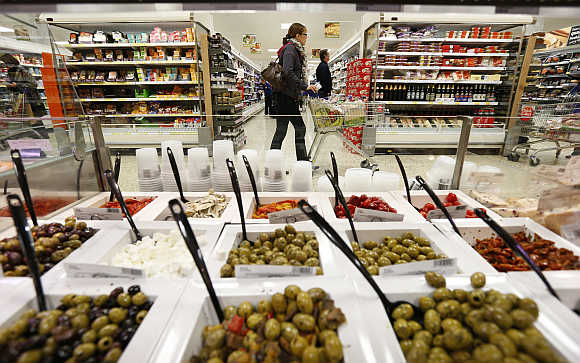 | « Back to article | Print this article |
Policy change unlikely to bring instant dollar inflows
Even as the government prepares to make changes in the multi-brand retail policy to woo foreign investors, experts feel substantial changes in the segment are unlikely at this point. The Department of Industrial Policy and Promotion has prepared a Cabinet note to relax the foreign direct investment policy in the multi-brand retail segment, cleared last September amid much political opposition.
Ironically, the policy, despite the political cost it has borne, is yet to fetch a single dollar, as not a single proposal has been received from companies.
Click NEXT to read more...
Policy change unlikely to bring instant dollar inflows
The proposed Cabinet note mentions making three concessions - relaxing the one-million population criterion for cities to allow foreign investors into the multi-brand segment; 30 per cent mandatory sourcing from India may now include even medium-scale enterprises, with investment of up to $2 million, against $1 million earlier; and though 50 per cent of the investment must be into back-end operations, the condition is applicable only for the first tranche.
If these changes are implemented, industry would certainly welcome the revisions. However, ahead of several state elections and the 2014 Lok Sabha polls, analysts feel foreign retailers are unlikely to take a chance.
Click NEXT to read more...
Policy change unlikely to bring instant dollar inflows
On condition of anonymity, a representative of a global chain asked what if the next government imposed additional conditions on foreign retailers, making it tough to conduct business? Also, what if they were not allowed to move out?
“State-by-state approval for retail chains remains the biggest challenge,” said Technopak Advisors founder and Chairman Arvind Singhal. Political uncertainty might also be a hurdle, he said.
Experts say the changes being proposed in the multi-brand policy may help major foreign supermarkets such as Walmart, Carrefour and Tesco, but not the entire retail sector. There may be some movement in the big foreign supermarket segment, as these chains can afford to invest $50 million into back-end operations in the first three years, of a total of $100 million.
Click NEXT to read more...
Policy change unlikely to bring instant dollar inflows
“But what about foreign electronics, clothing and pharmaceutical companies? These cannot, and they don’t need to, invest $50 million in back-end,” said Singhal. “Is the policy only for big foreign retailers, or for the sector as a whole?” he asked.
If the changed policy is positive for big brands, does it mean the likes of Walmart, Carrefour and Tesco would start filing applications soon? Nobody wants to speculate on that. Going by the noise the industry has been making, including Walmart’s latest statement it cannot source more than 20 per cent from India (against the mandatory 30 per cent), investors would wait and watch before putting in big dollars.
Click NEXT to read more...
Policy change unlikely to bring instant dollar inflows
Mandatory sourcing from small- and medium-scale industries remains a significant stumbling block for foreign chains, besides political uncertainty and the economy being under stress.
The government is yet to answer specifically to the question of what would happen when a small enterprise grows big over the years. Would foreign retail chains keep scouting for small and medium enterprises to source goods from, time and again?
Click NEXT to read more...
Policy change unlikely to bring instant dollar inflows
Not only that, industry has some more concerns on its list. These are: only company-owned and company-operated structures would be permitted in multi-brand retail; the front-end investment should be new, too; global sourcing must be distinct from the compulsory 30 per cent buying from small and medium enterprises; a cash-and-carry company’s sales to a group retail company must be restricted to 25 per cent of the total sales; and the fact that states would have the power to impose additional conditions.






